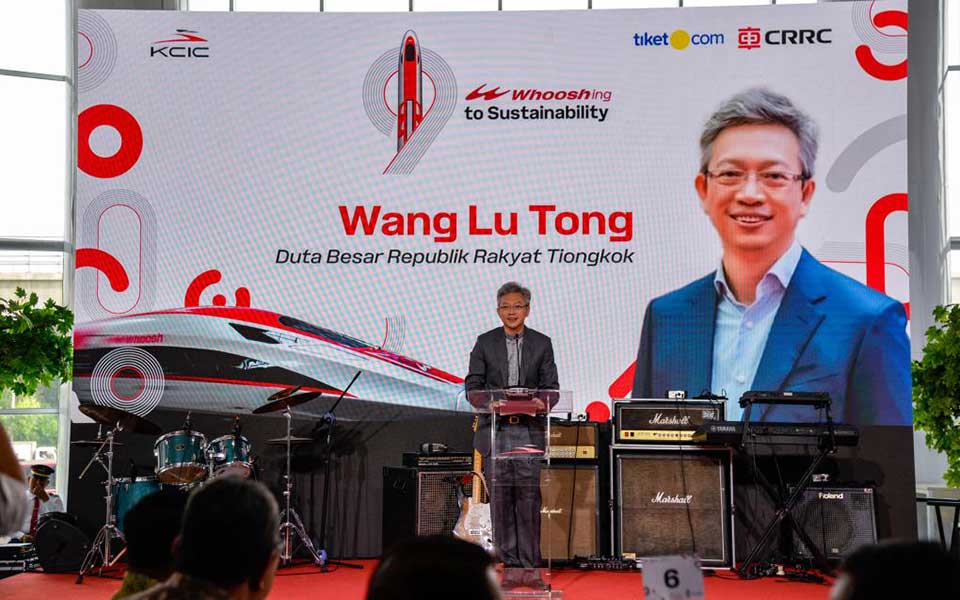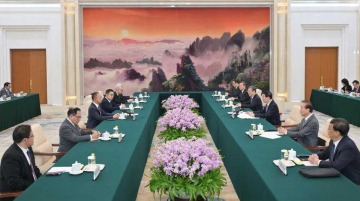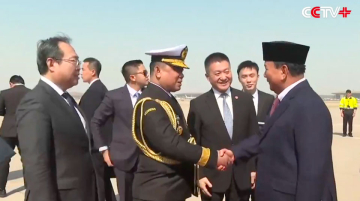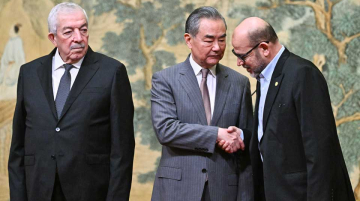
The recent appointment of Wang Lutong as China’s 14th Ambassador to Indonesia signifies a pivotal moment in the growing relationship between the two nations. Arriving in Jakarta in late November, Wang succeeds Lu Kang, who served as Beijing’s envoy since 2021.
As China and Indonesia strengthen their ties, Ambassador Wang faces a range of critical challenges that will shape the future of this partnership. These include addressing domestic unrest and navigating complex geopolitical tensions, which will require careful diplomacy and strategic leadership.
Wang Lutong, 55, is an experienced diplomat who has held senior positions managing ties in both Europe and the South Pacific. He served as China’s ambassador to New Zealand from 2013 to 2017 and was appointed director of the Department of European Affairs in 2019, a role similar to that of an assistant secretary of state in the U.S. Department of State.
During his five-year tenure in New Zealand, Wang engaged with matters such as managing public opinion, addressing environmental concerns, and strengthening ties with a nation known for its strong democratic values. While specific details of his work in Wellington remain limited, these experiences, nonetheless, will likely serve him well in navigating similar challenges in Indonesia.
Wang’s experience overseeing European relations likely exposed him to managing complex issues in regions where Chinese policies face significant scrutiny, particularly concerning topics like the Hong Kong issue and the escalating tensions in the South China Sea. While the regulatory frameworks in Europe and Indonesia differ substantially, many of the broader themes—such as balancing economic growth with public concerns about sustainability—remain relevant in both contexts.
China’s Controversial Role in Indonesian Development
At a time when China’s Belt and Road Initiative (BRI) in Southeast Asia has entered its “Small and Beautiful” phase, characterized by a reduction in large-scale projects and a focus on smaller, targeted investments, Indonesia remains both a critical partner and a source of tension. As Southeast Asia’s largest economy, Indonesia plays a pivotal role in regional geopolitics. Despite substantial Chinese investments in infrastructure, energy, and telecommunications, these projects frequently spark concerns over their economic, environmental, and social implications.
Indonesia’s commitment to transitioning to cleaner energy contrasts with the country’s current dependence on coal. Although Chinese-funded coal projects are often criticized, Indonesia itself remains one of the largest coal producers and exporters globally, driven in part by its own policies and priorities.
Local resistance to Chinese projects often stems from broader systemic issues, such as weak regulatory enforcement by Indonesian authorities and a lack of oversight on labor practices. Corruption and governance challenges within Indonesia’s resource sectors, namely coal and nickel mining, exacerbate these problems. Addressing these issues will require collaborative efforts from both Chinese companies and Indonesian authorities to ensure sustainable and equitable development.
Wang’s diplomatic background, including his tenure in New Zealand and leadership in managing European relations, has likely equipped him to navigate complex bilateral dynamics. Balancing economic interests with public sentiment is a challenge common to many diplomats. His previous experience in regions where Chinese investments have faced public scrutiny may provide valuable insights for addressing similar issues in Indonesia.
To effectively address local resistance, Wang will need to emphasize transparency and collaborate with a diverse group of local stakeholders to help resolve environmental and labor concerns related to Chinese investments in Indonesia. This would be challenging for any diplomat, but more so for a Chinese ambassador given their well-known reluctance to engage in unscripted public diplomacy.
The South China Sea Challenge and Anti-China Sentiment
Indonesia’s position in the South China Sea adds further complexity to Wang’s diplomatic mission. The Natuna Islands, situated within Indonesia’s exclusive economic zone at the southern edge of the South China Sea, remain a key point of contention between the two countries. Although Indonesia has largely avoided direct confrontation with China on this issue, it consistently asserts its sovereignty over the waters surrounding the Natunas. Wang will need to handle this sensitive matter delicately, ensuring diplomatic relations are preserved while respecting Indonesia’s territorial integrity.
Rising anti-China sentiment in Indonesia presents another significant challenge for Wang. Public criticism has grown regarding several aspects of China’s policies, including its assertive actions in the South China Sea, labor practices, environmental degradation, and perceptions of economic dependency. While Indonesia has maintained a pragmatic stance toward China, increasing public dissatisfaction with these issues could pressure the government to reassess its relationship with Beijing.
The Public Doesn’t Know Much About China
The Indonesian public’s general knowledge about China remains limited. A recent survey by the Center of Economic and Law Studies (CELIOS) revealed that many Indonesians have little knowledge of China, its culture, and its policies. This lack of awareness could contribute to misconceptions and mistrust, which can be exacerbated by negative media coverage.
To address this, Wang will need to do a lot more public outreach that promotes a more balanced perception of China. His approach should highlight the positive impact of Chinese investments while also acknowledging legitimate public concerns about the environmental and labor problems associated with Chinese investment. One way to do this would be for Wang to publicly and repeatedly remind Chinese companies operating in Indonesia that they are obligated to adhere to local laws and regulations and subject to punishment by Indonesian authorities should they violate local laws.
China and the Great Power Competition in Southeast Asia
Indonesia’s growing importance in China’s regional strategy adds further complexity to Wang’s mission. As Southeast Asia’s largest economy, Indonesia wields considerable geopolitical influence, and its increasingly assertive foreign policy seeks to balance relations with China, the U.S., and other global powers. These dynamics present significant challenges for Wang, who must navigate Indonesia’s evolving regional role while safeguarding China’s strategic interests. Given Indonesia’s strategic location and rising influence, Wang will need to adopt a flexible and responsive approach to these shifting geopolitical realities.
Ultimately, Wang’s success will depend on his ability to balance advancing China’s economic interests with addressing Indonesia’s social, environmental, and geopolitical concerns. He must tackle rising anti-China sentiment while fostering mutual understanding and deeper cooperation between the two nations. His appointment reflects China’s recognition of the complexities in its relationship with Indonesia and the need for experienced diplomacy.
Muhammad Zulfikar Rakhmat is the Director of the China-Indonesia Desk at the Center of Economic and Law Studies (CELIOS).





